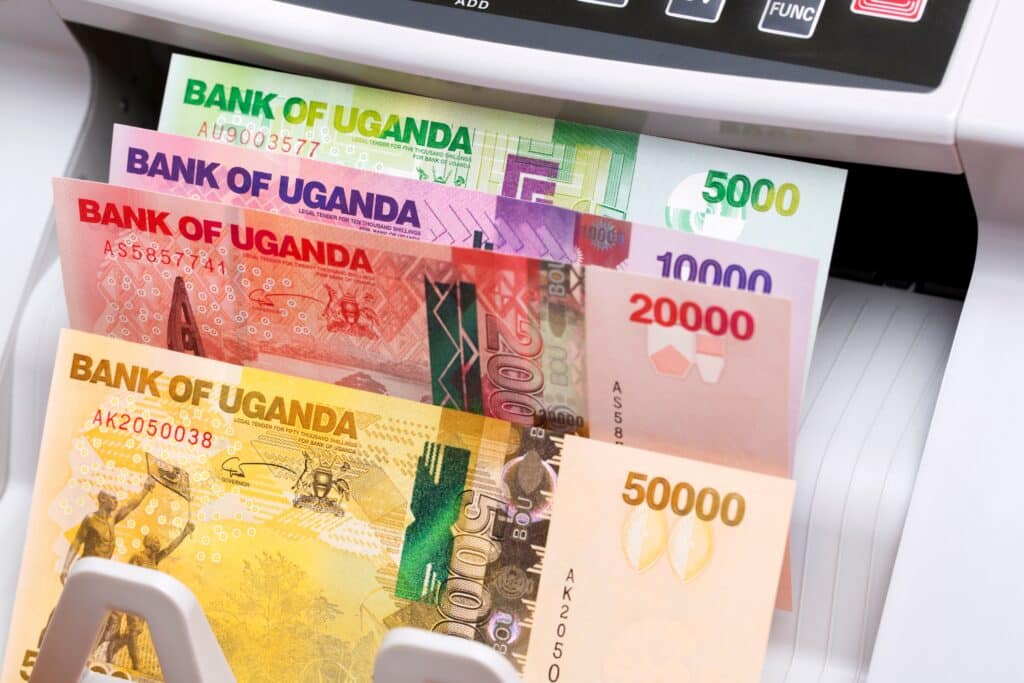
If you’ve travelled to Uganda or proudly call this East African country home, you’ll know it boasts breathtaking landscapes, vibrant culture, and a growing economy. Uganda is renowned for its majestic mountain ranges, the River Nile, and the largest number of mountain gorillas in the world.
Beyond its natural beauty, Uganda offers a unique cultural experience, including delicious street food like sambusas, roasted maize, and the famous vegetable omelette known as a “rolex.” At the heart of its economy is the Ugandan shilling (UGX), a currency that reflects the nation’s rich history and cultural heritage.
Here’s our latest guide to Uganda’s currency, complete with helpful tips and interesting facts.
Fast Facts: Ugandan Shilling
- The Ugandan shilling was introduced in 1966, following Uganda’s independence from Britain in 1962.
- Uganda’s current currency structure includes:
- Banknotes: UGX 1,000, UGX 2,000, UGX 5,000, UGX 10,000, UGX 20,000, UGX 50,000
- Coins: UGX 1, 2, 5, 10, 50, 100, 200, 500, and 1,000
- The Bank of Uganda has redesigned and updated its currency seven times since its inception.
Understanding UGX Currency Exchange Rates
Exchange rates for the Ugandan shilling fluctuate based on global supply and demand. Whether you’re travelling to Uganda or sending money home, planning ahead is key.
- How to get the best rates: Search for “GBP to UGX” or your local currency paired with UGX. Compare rates offered by banks, exchange bureaus, and online platforms.
- Travelling tips: Bring cash to Uganda for everyday purchases, as credit card acceptance is limited outside of major cities.
Send and Receive Money Internationally in the UK with Remitly.
Get started with our free mobile app.
Download
5 Things to Know About Ugandan Shillings
1. Ugandan Banknotes Are Stunning Works of Art
The 50,000-shilling note is celebrated internationally for its beauty. It features:
- Front: The ‘Stride Monument’ and Bwindi Impenetrable Forest
- Back: A depiction of silverback mountain gorillas
Other banknotes highlight Uganda’s landmarks, including the Nile River and the Parliament Building in Kampala.
2. Advanced Security Measures Ensure Authenticity
Uganda’s banknotes incorporate SPARK, an advanced optical security feature. Additional measures include:
- Colour-changing threads
- Crested crane watermarks
- Transparent sections displaying overlapping symbols
These features protect against counterfeiting and are worth noting when handling money in Uganda.
3. Cash Is Essential in Uganda
While ATMs are available in major towns, credit cards are mainly accepted at upscale establishments. If you’re using a credit card, expect surcharges. Visa cards are the most widely used.
4. Currency Updates Reflect Uganda’s Progress
The Ugandan shilling has undergone numerous updates, with the latest in 2010. These updates included new designs and enhanced anti-counterfeiting technology.
5. Multiple Currencies Are Widely Accepted
In addition to the shilling, Uganda accepts euros (EUR), pounds sterling (GBP), and US dollars (USD). Gorilla trekking tours and other high-value services often price their offerings in these currencies.
Sending Money to Uganda
Whether you’re sending money to family or making a payment, choosing the right service matters. Consider platforms like Remitly, which offer competitive rates and multiple delivery options.
Ugandan Shilling FAQs
What is the exchange rate for GBP to UGX?
Exchange rates fluctuate daily. Check online currency converters or consult your bank for the latest rates.
Can I use a credit card in Uganda?
Credit card use is limited to high-end hotels, restaurants, and safari lodges. It’s best to carry cash for most transactions.
What security features should I look for on Ugandan banknotes?
Look for colour-changing threads, watermarks of the crested crane, and transparent sections displaying overlapping symbols.
Are euros or pounds sterling accepted in Uganda?
Yes, euros, pounds, and US dollars are widely accepted, particularly for large transactions like tours.
Is it better to exchange money in Uganda or before travelling?
You may get better rates locally in Uganda, but plan to exchange a small amount before travelling for initial expenses.
